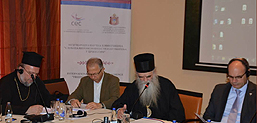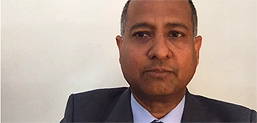Mr. Ahmed Shaheed: Freedom of Religion or Belief

 Mr. Ahmed Shaheed, Special Rapporteur on freedom of religion or belief
Mr. Ahmed Shaheed, Special Rapporteur on freedom of religion or belief
A very warm welcome to you all in Montenegro at this Roundtable on Freedom of Religion or Belief! My apologies for not being be able to be with you in person at this
roundtable. I know you have all undertaken an important endeavour today, coming together, to assist relevant stakeholders to understand better the right to freedom of religion or belief and to review the current draft law on the Legal Position of Churches and Religious Communities prepared by the Government of Montenegro in 2015. I have also heard the concerns of various religious communities regarding the re-registration requirements under the draft law, which are cumbersome in process and discriminatory in nature. Besides, there is genuine fear that the draft law may further restrict many aspects of the right to manifest one’s religion or belief.
There is a need to clarify the role of the State in promoting and protecting the right to freedom of religion or belief, especially in regard to issues related to recognition. It is often forgotten that freedom of religion or belief, is an inalienable and non-negotiable human right; that it does not depend on administrative registration procedures; and that it does not require any State approval. The basis of freedom of religion or belief of all human beings as rights holders under international law is the inherent human dignity of all persons, and is not contingent upon State recognition.
However, the granting of legal personality that enables religious organisations and institutions to be operational in their religious activities, they maybe subject to some administrative and legal procedures. Here, the State has a duty under international law to facilitate the religious or belief communities and institutions in obtaining their legal personality and providing enabling conditions for the full enjoyment by every person of their right to freedom of religion or belief. Any such registration procedure should be quick, transparent, fair, inclusive and non-discriminatory.
The UN Human Rights Council and the UN General Assembly have repeatedly urged States to step up their efforts to protect and promote the freedom of thought, conscience and religion or belief. States are called “to review, whenever relevant, existing registration practices in order to ensure that such practices do not limit the right of all persons to manifest their religion or belief, either alone or in community with others and in public or private”. I hope that the Government of Montenegro, taking into account the concerns raised and suggestions provided by different stakeholders, will consider revising the draft law so that it becomes compatible with international human rights standards on promoting the right to freedom of religion or belief.
I wish you all a very productive deliberation and thank you!
https://drive.google.com/file/d/1MVKjU18GOXXhlj8rMOCVsJ-Hv3hvPOGI/view?usp=sharing
Source: mitropolija.com

